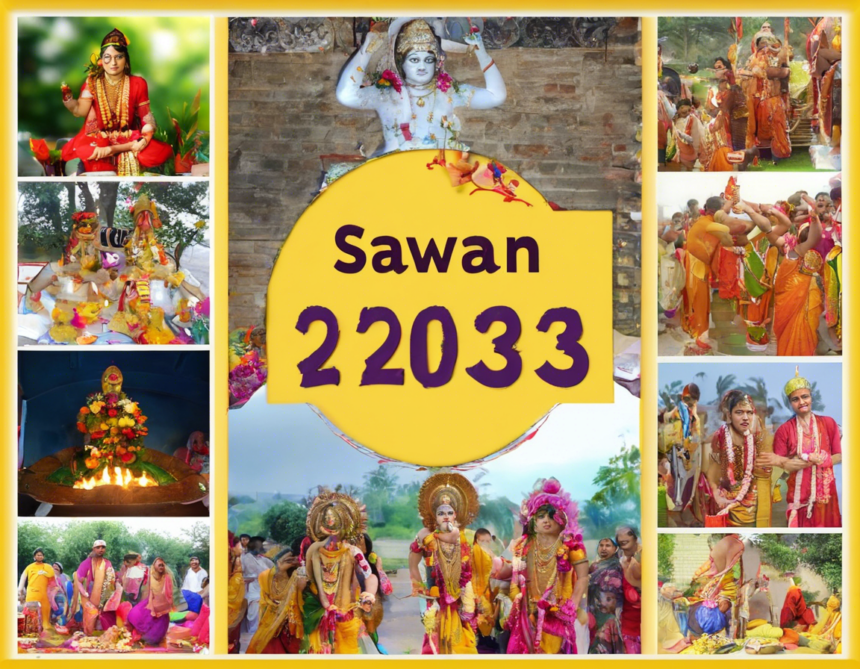The month of Sawan, also known as Shravan, holds great significance in Hindu tradition and is dedicated to Lord Shiva. Sawan is the fifth month of the Hindu calendar and typically falls between July and August in the Gregorian calendar. Devotees fast, worship, and celebrate during this auspicious month to seek blessings, fulfill wishes, and connect with the divine.
Significance of Sawan Month:
Sawan holds special importance for devotees of Lord Shiva. It is believed that prayers and offerings made during this month are highly auspicious and can bring about blessings, prosperity, and spiritual growth. According to Hindu mythology, the Samudra Manthan (churning of the ocean) took place during this month, resulting in the emergence of the potent poison Halahala, which Lord Shiva drank to save the world. This act led to Lord Shiva becoming Neelkanth, the one with a blue throat, symbolizing his benevolence and protection.
How to Celebrate Sawan Month:
-
Fasting: Fasting on Mondays, known as Shravan Somvar, is considered highly auspicious during the Sawan month. Devotees abstain from food and consume only fruits, milk, and water to seek Lord Shiva’s blessings.
-
Ritual Bathing: Taking a ritual bath in holy rivers such as the Ganges or local water bodies is believed to purify the body and soul. Devotees often collect water from these sacred sources to offer to Lord Shiva.
-
Offerings and Prayers: Devotees offer Bilva leaves, milk, water, honey, and other sacred items to Lord Shiva during this month. Chanting the Maha Mrityunjaya Mantra and the Shiv Chalisa is also considered beneficial.
-
Visiting Temples: Visiting Shiva temples, especially the Jyotirlingas, holds great significance during Sawan. Devotees offer prayers, perform Abhishekam (ritual bathing of the deity), and participate in special ceremonies.
-
Organizing Bhajans and Satsangs: Organizing devotional gatherings, bhajans, and satsangs dedicated to Lord Shiva is a common practice during Sawan. These gatherings foster a sense of community and deepen one’s spiritual connection.
Frequently Asked Questions (FAQs) About Sawan Month:
- Q: Can anyone fast during the Sawan month, or is it only for certain individuals?
A: Anyone can observe fasts during Sawan, regardless of age, gender, or background. It is a personal choice and a way to deepen one’s spiritual practice.
- Q: Are there specific foods that one should eat or avoid during Sawan fasts?
A: During Sawan fasts, devotees typically avoid consuming non-vegetarian food, alcohol, and certain spices. It is common to eat sattvic food such as fruits, milk, and nuts.
- Q: What is the significance of offering Bilva leaves to Lord Shiva during Sawan?
A: Bilva leaves are considered sacred in Hindu tradition and are believed to be dear to Lord Shiva. Offering Bilva leaves with devotion is said to please the deity and bring about blessings.
- Q: Are there any specific mantras or prayers recommended for chanting during Sawan?
A: The Maha Mrityunjaya Mantra, Om Namah Shivaya, and the Shiv Chalisa are commonly chanted during Sawan to invoke the blessings of Lord Shiva and seek his protection.
- Q: Is there a specific dress code to follow while visiting Shiva temples in Sawan?
A: While there is no strict dress code, wearing clean and modest attire is recommended when visiting temples, especially during auspicious months like Sawan.
- Q: Are there any taboos or restrictions to be mindful of during Sawan?
A: It is advisable to avoid negative thoughts, gossip, and indulgence in worldly pleasures during Sawan. Maintaining a pure and pious mindset is encouraged.
- Q: Can non-Hindus participate in Sawan celebrations and rituals?
A: Sawan celebrations are open to people of all faiths and backgrounds. Non-Hindus are welcome to participate in the festivities with respect and reverence.
- Q: Are there any specific charity or seva (service) activities recommended during Sawan?
A: Donating to charitable causes, feeding the needy, and participating in community service are considered meritorious acts during Sawan. Helping others is a way to express compassion and goodwill.
- Q: How long is the Sawan month, and when does it typically begin and end?
A: The Sawan month lasts for approximately 30 days, starting from the new moon day (Amavasya) and ending on the next Amavasya. The exact dates may vary each year based on the Hindu calendar.
-
Q: Can one perform special rituals or Pujas at home during Sawan, or is temple visitation necessary?
A: While visiting temples during Sawan is considered auspicious, one can also perform prayers, Abhishekam, and Puja at home with devotion and sincerity. Lord Shiva is believed to be easily pleased by pure-hearted offerings.
In conclusion, Sawan month is a time of spiritual significance, devotion, and celebration for devotees of Lord Shiva. By observing fasts, offering prayers, visiting temples, and engaging in acts of seva, individuals can deepen their connection with the divine and seek blessings for a fulfilling life. Embracing the traditions and rituals of Sawan can lead to inner transformation, peace, and prosperity in the lives of devotees.


Leave a Reply